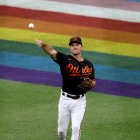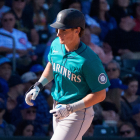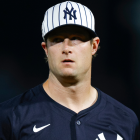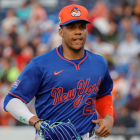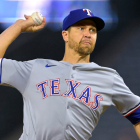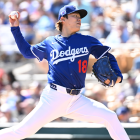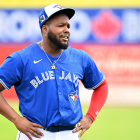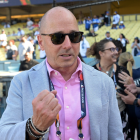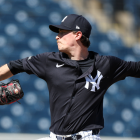
MLB commissioner Rob Manfred made plenty of headlines during his press conference on earlier this month, almost entirely due to his comments made on Oakland A's owner John Fisher's ongoing efforts to move the team to Las Vegas. The A's cleared a major hurdle when Nevada governor Joe Lombardo signed off on a nine-figure package of taxpayer money to assist Fisher in building a new stadium on the Las Vegas strip. Manfred's words were callous at best and downright adversarial towards A's fans in Oakland at worst.
Something else he said caught my eye. Among the other subjects Manfred touched on in his meeting with the press was the ongoing discourse on Pride Nights both within MLB and American sports as a whole. The Washington Post's Chelsea Janes reported the following quotes from Manfred, who was asked about teams individually choosing whether or not to host Pride Nights rather than having it be a league-wide effort:
"We have told teams, in terms of actual uniforms, hats, bases that we don't think putting logos on them is a good idea just because of the desire to protect players: not putting them in a position of doing something that may make them uncomfortable because of their personal views."
Janes also reported that Manfred said the teams know their own markets best, and that it's a local decision.
I didn't expect to make the following point when I pitched this column, but I'll make it now and then explain why: Rob Manfred, entirely by accident and for entirely the wrong reasons, arrived at the right conclusion when he said he preferred that the clubs be the ones to decide how to handle Pride.
Before we get too deep into the weeds, I should say this – I'm not straight, and I've loved baseball all my life. I am, theoretically, the target audience for a major-league team's Pride Night. Moreover, I'm someone who's materially and emotionally invested in baseball both as a source of community with my fellow friends, and as someone who's spent the better part of a decade writing and editing baseball coverage. MLB's level of care for fans – and yes, particularly its queer fans – is something that's quite important to me.
But I would never claim to speak for every queer person, or even every queer baseball fan. I'm a white-passing, cishet-passing guy. My lived queer experience is a relatively easy one, and not everyone in the queer community will agree with the points I arrive at here. The community is far from a monolith, and that's OK.
Personally, Manfred's comments about Pride Nights were gutting in the moment, even if they were wholly unsurprising.
MLB is a business, and will always operate primarily with an eye toward profit and endless growth. Nearly all of its actions across the board can be explained by that motive. Manfred's job is to be a centralizing force and make sure the number on MLB's balance sheet never stops going up. He works for the owners of the 30 teams and is beholden to them, and to their checkbooks.
MLB will therefore, when it comes to social issues like LGBTQ+ rights and Pride, act in accordance with whichever way the nation's social winds are blowing. The current headings of those winds are complex, to say the least. Queer people are more visible in pop culture than ever, and more people than ever are comfortable enough to come out. Young people in particular are more willing to express themselves.
Perhaps correspondingly, the backlash from homophobic people has become vicious. Sports are no exception.
With the fever pitch of venom directed at queer people, tensions have been heightening around major sports teams hosting Pride Nights – and some players have been resisting participation. Five pitchers on the 2022 Tampa Bay Rays refused to wear Pride-themed patches on their jerseys. A number of NHL franchises had their own Pride Night controversies this past season, kicked off by when the Flyers' Ivan Provrov refused to wear a Pride Night warmup jersey. The NHL has now banned teams from wearing all themed warmup jerseys as a response to the controversy.
And this season, the Dodgers all but invited controversy when they gave in to bad-faith demands concerning a charity group they invited to Pride Night. The group was eventually reinvited, but the Dodgers shortly thereafter announced a Christian Faith and Family Day, seemingly as a direct counter to a night devoted to acceptance of the queer community.
The Dodgers also, bewilderingly, seemingly allowed protestors to take over one of their parking lots on Pride Night. The protest was promoted by far-right influencers, many of whom formed the brain trust behind the January 6 insurrection. One of the groups involved with the protest have mingled with the violent Proud Boys, a white nationalist organization, in the past.
Given the current political climate, one can understand from a cold capitalistic standpoint why Manfred is trying to both have his cake and eat it too. He's left room for the 30 clubs to opt in to Pride Night, but also seemingly directed any homophobic backlash at the clubs themselves and not the league. Protect the shield, as they say in the NFL.
But Manfred is trying to both have his cake and eat it too, not succeeding. Manfred says he's trying to "protect" players who don't want to wear Pride imagery by not having a league-wide Pride initiative on the scale of, say, Memorial Day, Fourth of July or Mother's Day, when every player dons special caps and wristbands. What is Manfred protecting them from? What specific personal beliefs is he speaking of?
We know the answer to the second question, of course – the belief that LGBTQ+ people are bad, that being anything but cis and straight is at best an inherent moral failing, and at worst a cause for persecution. The "protection" then is twofold. First, he's protecting players from, as he said, doing something against those "personal beliefs," even if those personal beliefs are inherently prejudiced and come from a place of hate.
What the five Rays pitchers did last season would be fully legal by the text of the new CBA if Pride was a league-designated theme day. Located on page 234 of the CBA (full document available here) is the following text:
A player who declines to participate, in whole or in part, in any MLB-designated theme day shall be permitted to wear any item or use any equipment he would otherwise use/wear during a non-theme day.
In essence, by not making Pride Night an MLB-designated theme day, he's given players cover from attracting scornful attention by declining to wear Pride gear. He's prioritized the feelings of homophobes, "protecting" them from having to deal with potentially negative media coverage and ensuing controversy. And it's all but certain that a player opting out of Pride Night would generate far less venom than a player opting out of, say, Memorial Day or Independence Day.
As highlighted in the news piece linked above, the Tampa Bay Times' Marc Topkin reported that MLB does not want teams to use uniforms to "promote certain causes" unless the initiative is league-driven, and that the Giants and Dodgers have been allowed to wear Pride-themed patches this season because of a prior agreement.
Of course, one must ask: Should Pride be an MLB-designated theme day?
It's undeniably important that queer people, especially queer kids, have definitive demonstrations that they are valid, accepted, and welcome within the confines of that which makes them happy, whether that be in sports, art, hobbies, etc. Imagine a young Mets fan, for example, who's wrestling with their identity and the question of whether a gay person belongs in baseball, firing up Twitter and seeing Mark Canha and Francisco Lindor being so eagerly welcoming and encouraging people to come out to Pride Night. Imagine being that kid and getting a ballpark souvenir with the Mets logo in rainbow colors, and seeing your favorite players affirm that baseball is for everyone. That means something.
Of course, all of that can – and more importantly, has – been achieved without an MLB-designated Pride initiative. The Mets did all of that this year, on their own.
Let's conduct a quick thought experiment. What would an MLB-designated Pride look like? Would it be anything more than some rainbow-themed caps, a two-and-a-half minute video posted on social media, some donations, and an in-stadium Madonna playlist? Would it not, in essence, be the same as the rainbow-colored big bank float at a city's Pride Parade?
Would the league truly take time to reckon with Glenn Burke, the first player to come out post-retirement, all but being forced out of the sport because of his sexuality? Would it understand that Pride's origins are rooted in an anti-police riot, started by patrons of a club tired of constant harassment at the hands of the NYPD, spearheaded in part by trans women of color?
Do I, as a queer person, really want to see those same players who want nothing to do with Pride Night, in one of those rainbow caps, if they choose not to opt out? Not particularly, no.
I certainly don't speak for everyone like me. But I, personally, am not all that interested in a sanitized, corporatized version of Pride that's easily purchasable for an exorbitant price through Fanatics.
We shouldn't look to corporations for leadership on any social issue, be it queer rights or otherwise. They can provide useful springboards, both in terms of platforms and funding, for certain causes. But unless the unquestionable profit incentive is there, an organization like MLB will never approach this sort of thing earnestly. There is almost certainly an appetite for doing so among some individuals within the league and club front offices, but the top-down motivation does not seem to exist.
One might ask whether earnestness is necessary if the goal of fostering acceptance and positivity is the desired outcome, but I would argue that a non-earnest show of support couched only in aesthetics would not have nearly the same power.
What does earnestness look like? It's hard to quantify, but it probably looks a whole lot like what the Baltimore Orioles did on Wednesday night, when the team's broadcast highlighted local LGBTQ+ charities and the team Twitter account posted important facts about the struggles faced by the queer community instead of score updates and highlights.
Tonight is bigger than the game. pic.twitter.com/7R3NxpQcb5
— Baltimore Orioles (@Orioles) June 28, 2023
It probably looks a lot like Liam Hendriks not wanting to sign with a team that didn't have a Pride Night. It probably looks like players like Canha, Sean Doolittle, Julio Rodriguez, Yandy Diaz, Chris Taylor and so many more doing things, both big and small, to show queer fans that they belong.
With all that being said, what does that mean for MLB's place in Pride Month?
A top-down effort would have never resulted in something like what the Orioles did. It would have been stale, rote, and amounted to little more than rainbow caps and the blaring of Lady Gaga's "Born this Way."
While some teams see Pride as a box to be checked, others – like the Orioles, or the Seattle Mariners – put more weight behind their efforts. And I would much rather that weight remain in place than deprive those communities of that genuine care by implementing a stale one-size-fits-all approach.
Of course, Manfred's comments about "protecting" players remain nonsense, and only serve to perpetuate the pervasive elements of homophobia within the sport that have helped ensure there's never been an publicly out queer big-league player on an active roster. The changing times and growing visibility of allies in clubhouses will hopefully change that soon. Statistically speaking, there's likely a few closeted players in the league as we speak. They don't owe it to anyone to come out, of course, but fostering a more accepting environment can only be a good thing for both the players and fans.
I'm not usually all that easily moved. I can be something of a pessimist. There is a cold, hardened lump of coal inside me. But going to Pride this year in New York City was a moving experience. I skipped the official parade, which is chock full of corporate floats and mostly involves standing behind metal barricades while multiple people try to hand you Pride-branded bags of Cheez-Its before the processions for the tech companies and banks came by (which was my exact experience at last year's event).
Instead I went to the tertiary festivities and marches, which were more free-form and true to the roots of the event. It was beautiful. My ideal version of Pride is unapologetic. It's no-nonsense, doesn't cut corners, and is not at all concerned with what a moderate swing voter in a suit might think.
That's the same energy I want from a Pride night at a professional sports event. Make it count. Make it earnest. Make it feel like something that's genuinely of service to the people the event claims to represent. Make it fun.
We live in fraught, terrifying times. Corporations will not save the queer community from the ongoing attacks being launched from statehouses, cable news sets, the highest court in the land and extremist minds. But now more than ever, shows of solidarity and acceptance can serve as meaningful gestures. Perhaps stewardship of those gestures is indeed best left to the individual teams and the players.
There's no clean, tidy solution here. All I can truly ask for, in the end, is that Pride be treated not as a marketing scheme or an aesthetic, but as a genuine show of support. The Orioles are right. Baseball is for everyone, as are all sports. As this year's Pride Month – a particularly messy one for baseball – comes to a close, I hope that more teams and players will grow vocal in their support. Solidarity and love are not boxes to be checked. They're imperatives.







